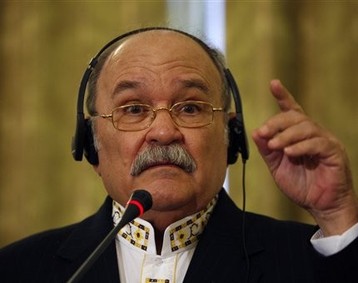UN General Assembly leader asks West to stop demonizing Iran
 New York - UN General Assembly President Miguel d'Escoto Brockmann launched yet another campaign on Tuesday against Western governments, urging them to stop demonizing Iran and its leader, Mahmoud Ahmadinejad, who has called for wiping Israel off the map.
New York - UN General Assembly President Miguel d'Escoto Brockmann launched yet another campaign on Tuesday against Western governments, urging them to stop demonizing Iran and its leader, Mahmoud Ahmadinejad, who has called for wiping Israel off the map.
Miguel d'Escoto, a former Sandinista foreign minister of Nicaragua in the 1980s and a Roman Catholic Maryknoll priest, has advocated reform and "democratization" of the United Nations since he assumed leadership of the 192-nation assembly last September.
Last month, he denounced the International Criminal Court's decision to arrest Sudan's President Omar al-Bashir, who was charged with war crimes and crimes against humanity.
"We hear those terrible things they said about Ahmadinejad, why do they said those things," he said upon returning from a world tour to visit Syria, Finland, China, Bahrain, Switzerland and Iran.
"Ahmadinejad was demonized," Miguel d'Escoto said in a press conference.
Asked whether his remarks were appropriate for an assembly president, Miguel d'Escoto said it is his duty to speak up, claiming he has the support of an "immense majority" of UN members. He claimed that the office of the UN secretary general had tried to prevent him from visiting those countries.
He defended al-Bashir's move to hold peace talks with the major rebel factions in the ethnic war in Darfur, saying, "It looks promising, gives it a chance."
"We in the West are notorious for saying things we don't understand," he said. "They shoot first and find out later."
Miguel d'Escoto has been aiming his criticism at the United States, whose influence the leftist government in Nicaragua in the 1970s and 1980s bitterly fought against.
Al-Bashir allowed talks between his government and leaders of Justice and Equality Movement (JEM), an African rebel group that has been fighting with Khartoum-backed Arab militias in Darfur since 2003. An estimated 300,000 civilians have died in the fighting, which some countries, including the United States, have called genocide.
The ICC charged al-Bashir with killings in Darfur and wanted him arrested. The African Union and Arab League opposed the arrest warrant issued by the ICC on the grounds that arresting al-Bashir would jeopardize the diplomatic efforts to end the fighting in Darfur. (dpa)